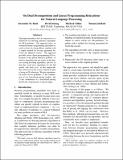On dual decomposition and linear programming relaxations for natural language processing
Author(s)
Rush, Alexander Matthew; Sontag, David Alexander; Collins, Michael; Jaakkola, Tommi S.
DownloadJaakkola_On dual.pdf (348.8Kb)
OPEN_ACCESS_POLICY
Open Access Policy
Creative Commons Attribution-Noncommercial-Share Alike
Terms of use
Metadata
Show full item recordAbstract
This paper introduces dual decomposition as a
framework for deriving inference algorithms
for NLP problems. The approach relies on
standard dynamic-programming algorithms as
oracle solvers for sub-problems, together with
a simple method for forcing agreement between
the different oracles. The approach
provably solves a linear programming (LP) relaxation
of the global inference problem. It
leads to algorithms that are simple, in that they
use existing decoding algorithms; efficient, in
that they avoid exact algorithms for the full
model; and often exact, in that empirically
they often recover the correct solution in spite
of using an LP relaxation. We give experimental
results on two problems: 1) the combination
of two lexicalized parsing models; and
2) the combination of a lexicalized parsing
model and a trigram part-of-speech tagger.
Date issued
2010-10Department
Massachusetts Institute of Technology. Computer Science and Artificial Intelligence Laboratory; Massachusetts Institute of Technology. Department of Electrical Engineering and Computer ScienceJournal
Conference on Empirical Methods in Natural Language Processing 2010, Proceedings
Publisher
Association for Computational Linguistics
Citation
Rush, Alexander M. et al. “On dual decomposition and linear programming relaxations for natural language processing.” Proceedings of the 2010 Conference on Empirical Methods in Natural Language Processing. Cambridge, Massachusetts: Association for Computational Linguistics, 2010. 1-11.
c2010 Association for Computational Linguistics.
Version: Author's final manuscript